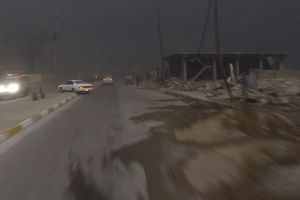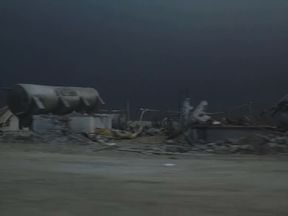

They say Islamic State fighters were forcing women and children into trucks to act as human shields as they retreated to the Mosul stronghold in Iraq.
In the dark, those who could, made their escape.
The oily fog smothers you and it is difficult to breathe. It is mid-afternoon on what should be a sunny day here, but it's dark.
The southern front of the campaign to relieve Mosul is a miserable place.
Pipelines set on fire by Islamic State in the battle for al Qayyara still burn ferociously. Firemen are trying to snuff them out by piling huge amounts of sand on flames spiking 100m into the sky.
The plumes of foul, oil-filled black smoke billow across miles of desert, engulfing towns and villages.
It is an apocalyptic scene that just adds to the utter misery of this fight, which each day seems to get worse.
A convoy of military Humvees and armoured personnel carriers passes by us, through the smoke and along roads dug up by IS before they departed.
The Iraqi military should be further north by now, but they have been hampered by the stiff resistance of the jihadists defending the southern flank of Mosul.
We travelled northwards to the front line and al Hud, a seemingly insignificant village on the side of the Mosul road.
It may become very important.
So far, it is the only known place where the people have risen up against Islamic State. With the Iraqi army advancing, they raised the Iraqi flag and attacked IS fighters - killing up to nine in the streets and burning their bodies.
But their uprising was not coordinated with the Iraqi army. The soldiers did not enter the village and support them.
Within two hours, IS returned and murdered those involved. Belatedly, the Iraqi commanding officer ignored specific orders and drove into town and relieved the village.
Now, still angry about the lack of support, residents gather at street corners and talk about what happened.
It has been an awakening for them and they hope it spreads elsewhere, although the United Nations has expressed concern that such uprisings could lead to the slaughter of thousands by IS.
I met Sabry Abdullah on a street corner. A former air force officer, he speaks perfect English and French.
He has stayed throughout the IS occupation and is proud of his village's "revolution", as he calls it, against them.
"They have taken thousands of people and made them go to Mosul but we refused," he told me.
"We had a revolution and killed them. But the Iraqi army was too late.
"I spoke to the general. He said he had orders not to come into our town. We thanked them but they were too late."
This type of fightback against Islamic State could be the key to breaking down the defence of Mosul.
Right now, IS is so well dug in - and its fighters prepared to die - it is difficult to see how the city can be taken.
Through the gloom, small groups of fleeing civilians make their way south to safety. They are the internally displaced, and there could be a million of them.

World is coming to an end
ReplyDeleteOsan di oru
ReplyDelete